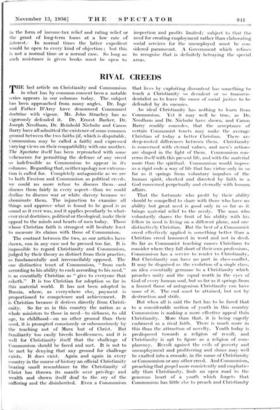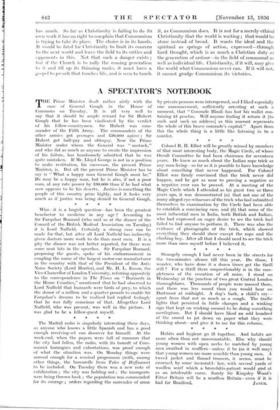RIVAL CREEDS T HE last article on Christianity and Communism in
what has by common consent been a notable series appears in our columns today. The subject has been approached from many angles. Dr. Inge and Father D'Arcy have denounced Communist doctrine with vigour. Mr. John Strachey has as vigorously defended it. Dr. Ernest Barker, Dr. Joseph Needham, Dr. Reinhold Niebuhr and Canon Barry have all admitted the existence of some common ground between the two faiths (if, which is disputable, Communism may be called a faith) and expressed varying views on their compatibility with one another. The Spectator itself has been reproached with some vehemence for permitting the defence of any creed so indefensible as Communism to appear in its columns. Regarding that, neither apology nor extenua- tion is called for. Completely antagonistic as we arc to both Fascism and Communism as political creeds. we could no more refuse to discuss them—and discuss them fairly in every aspect—than we could decline to discuss war or white slavery because we abominate them. The injunction to examine all things and approve what is found to be good is as sound as it ever was, and it applies peculiarly to what- ever rival doctrines, political or theological, make their appeal to the minds and hearts of men today. Those whose Christian faith is strongest will hesitate least to measure its claims with those of Communism.
The contrast between the two, as our articles have shown, can in any case not be pressed too far. It is impossible to regard Christianity and Communism, judged by their theory as distinct from their practice, as fundamentally and irreconcilably opposed. The one distinctive tenet of Communism, " from each according to his ability to each according to his need," is as essentially Christian as " give to everyone that asketh." It is too Christian for adoption so far in this 'Material world. It has not been adopted in Russia, where, as everywhere else, payment is proportioned to competence and achievement. It is Christian because it derives directly from Christi- anity. So. far as in this country the nation as a whole ministers to those in need—to sickness, to old age, to childhood—on no other ground than their need, it is prompted consciously or subconsciously by the teaching not of Marx but of Christ. But familiarity too easily breeds heedlessness, and it is well for Christianity itself that the challenge of Communism should be faced and met. It is not to be Met by denying that any ground for challenge exists. It does exist. Again and again in every country in the course of history an official Christianity bearing small resemblance to the Christianity of Christ has thrown its mantle over privilege and wealth and shown itself deaf to the cry of the suffering and the disinherited. Even a Communism that lives by exploiting discontent has something to teach a Christianity so decadent or so transcen- dentalist as to leave the cause of social justice to be defended by its enemies.
An ideal Christianity has nothing to learn from Communism. Yet it may well be true, as Dr. Needham and Dr. Niebuhr have shown, and Canon Barry readily concedes, that the acceptance of certain Communist tenets may make the average Christian of today a better Christian. There are deep-rooted differences between them. Christianity is concerned with eternal values, and men's actions are shaped in the light of them. Communism con- cerns itself with this present life, and with the material more than the spiritual. Communism would impose as a rigid code a way of life that has virtue only in so far as it springs from voluntary impulses of the human spirit, checked and directed by faith in a God concerned perpetually and eternally with human affairs.
That the fortunate who profit by their ability should be compelled to share with those who have no ability but great need is good only in so far as it brings material relief to the needy. The man who voluntarily shares the fruit of his ability with his fellow in need is living on a different plane, and one distinctively Christian. But the best of a Communist creed effectively applied is something better thin a Christian creed honoured in word and not in deed. So far as Communist teaching causes Christians to consider where they fall short of their own professions; Communism has a service to render to Christianity. But Christianity can have no part in class-conflict. It may be disguised as the evolution of a single class, an idea essentially germane to a Christianity which preaches unity and the equal worth in the eyes of God of every human soul, but so far as it springs from a fanned flame of antagonism Christianity can have none of it. The end must be attained, but not by destruction and strife.
But when all is said the fact has to be faced that to a considerable section of youth in this country Communism is making a more effective appeal tluin. Christianity. More than that, it is being eagerly embraced as a rival faith. There is much more in this than the attraction of novelty. Youth today is predisposed towards a religion of revolt, and Christianity is apt to figure as a religion of com- placency. Revolt against the evils of poverty and unemployment and profiteering and slums may well be exalted into a crusade, in the name of Christianity or Communism or any other creed. And Communism, preaching that gospel more consistently and emphatic- ally than Christianity, finds an open road to the generous heart of a youth which forgets that ComMunism has little else to preach and Christianity has much. So far as Christianity is failing to do its own work it has no right to complain that Communism is trying to take ib; place. The choice is in its hands. It would be fatal for Christianity to limit its concern to the next world and leave the field to its critics and opponents in this. Not that such a danger exists ; but if the Church is to rally the coming generation to it and fill up its thinning ranks, it must have a gospel to preach that touches life, and is seen to touch it, as Communism does. It is not for a merely ethical Christianity that the world is waiting ; that would be stone instead of bread. It wants the ideal and the spiritual as springs of action, expressed—through hard thought, which is as much a Christian duty as the generation of ardour—in the field of communal as well as individual life. Christianity, if it will, may give the world what Communism never can. If it will not, it cannot grudge Communism its victories.















































 Previous page
Previous page